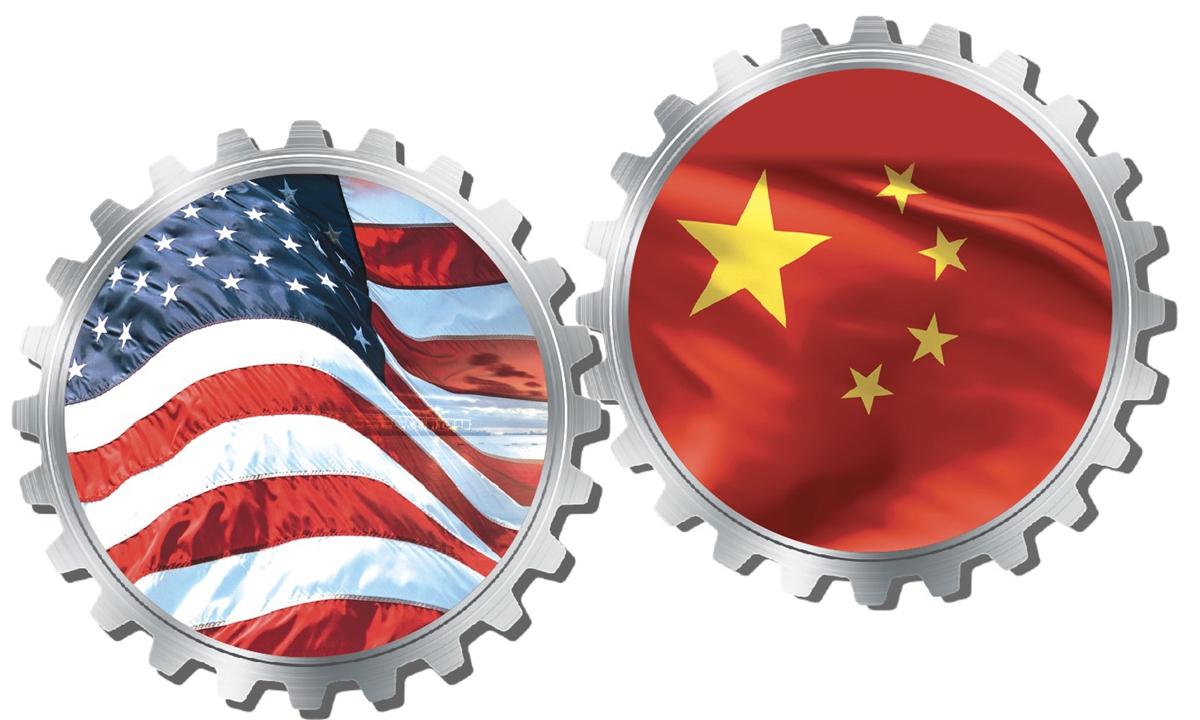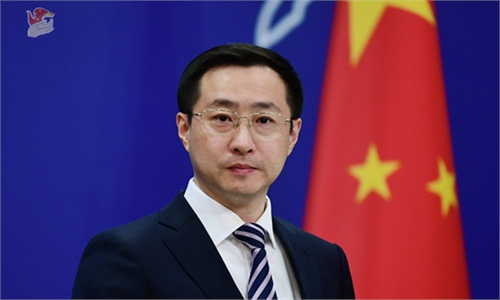China, US to hold economic, trade talks in Switzerland
Any dialogue must be based on equality, respect and mutual benefit: FM spokesperson

China-US Photo: VCG
At the invitation of the government of Switzerland, He Lifeng, a member of the Political Bureau of the Communist Party of China Central Committee and Vice Premier of the State Council will visit Switzerland from May 9 to 12, Chinese Foreign Ministry spokesperson announced on Wednesday.
During his visit to Switzerland, He, as the Chinese lead person for China-US economic and trade affairs, will have a meeting with the US lead person Treasury Secretary Scott Bessent.
Chinese expert said the fact that the two sides are going to meet is a good sign, however any progress depends on whether the US corrects its "unjust and illegal" protectionist actions.
Recently, the US said repeatedly it wants to negotiate with China. This meeting is requested by the US side, Chinese Foreign Ministry spokesperson Lin Jian said on Wednesday in response to media inquiries about China's expectations for the upcoming meeting.
Lin also noted that China firmly opposes the US's tariff hikes. This position remains unchanged. Meanwhile, as we've stressed many times before, China is open to dialogue, but any dialogue must be based on equality, respect and mutual benefit.
"To pressure or coerce China in whatever way simply does not work. We will resolutely safeguard our legitimate interests and uphold international fairness and justice," Lin said.
The Ministry of Commerce (MOFCOM) earlier on the same day also underscored that the new US administration has taken a series of unreasonable and unilateral tariff measures, which have severely disrupted bilateral economic and trade ties and the international economic and trade order, posing serious challenges to the recovery of the global economy. In order to defend its legitimate rights and interests, China has taken resolute countermeasures.
Recently, the US side has expressed willingness to engage in dialogue on tariffs and related issues through multiple channels. After a careful assessment of the US messages, China has decided to engage with the US side, taking into account global expectations, national interests, and calls from the American industry and consumers, the spokesperson said.
The spokesperson said China's position has been consistent and that if forced to fight, China will fight to the end. For talks, the door is open.
Any negotiations must be based on mutual respect, equality, and reciprocal benefit. If the US side wants to resolve issues through dialogue, it must face the negative impact of its unilateral tariffs and respect international trade rules, fairness and justice, as well as rational voices from all sectors, the spokesperson said.
As the first meeting between China and the US since the US-launched tariff war, this development sends a "positive signal" to a world troubled by the US tariffs, He Weiwen, a senior fellow at the Center for China and Globalization, told the Global Times on Wednesday, but cautioned that any progress depends on whether the US corrects its protectionist actions.
Cui Hongjian, a professor at the Academy of Regional and Global Governance at Beijing Foreign Studies University, noted that Washington's willingness to seek negotiations in itself reflects the failure of the first phase of its maximum pressure tactics against China, which have backfired and triggered mounting pushback both domestically and internationally.
"Therefore, the US needs to make the right choice and demonstrate sincerity in the upcoming meeting with China," Cui said.
Global, domestic backlash
Bessent, in an interview on Fox News, said the current tariff rates aren't sustainable and were the equivalent of a trade embargo. The talks on Saturday and Sunday will center on de-escalation rather than a big trade deal, according to a Bloomberg report on Tuesday.
"We've got to de-escalate before we move forward," Bessent said, noting the US "doesn't want to decouple."
This is a conciliatory signal from the US under mounting domestic and international pressure, as its chaotic tariff policies continue to disrupt both the global economy and the US industries across the board, Cui said.
Cui further cautioned against the unpredictability of US policy flip-flops that could introduce "significant uncertainty" into the negotiations, as the US has continued to send mixed signals on talks with China and tariffs on Chinese imports.
"The fact that the two sides are going to meet is a good sign, but the key lies on the US side," He noted, stressing that whether any substantial outcome emerges will depend on Washington's willingness to correct its "unjust and illegal" tariff policy - without preconditions or demands on China.
Meanwhile, the US sweeping and erratic tariff policies are facing backlash both at home and abroad.
The US trade deficit in goods and services soared to a record $140.5 billion in March. Year-to-date, the deficit has increased 92.6 percent, as companies and consumers rush to import goods before US government's sweeping global tariffs increase takes hold on July 6, NBC News reported on Tuesday.
US gross domestic product shrank 0.3 percent in the first quarter because of the biggest drag from net exports - the difference between total exports and total imports - in more than a half-century, according to Wells Fargo economists. Other parts of the economy also showed signs of slowing. Consumer spending rose 1.8 percent in the first quarter, the weakest pace since mid-2023, according to the report.
Long-term resilience
Zhou Mi, a senior research fellow at the Chinese Academy of International Trade and Economic Cooperation, said the decision to engage in talks with the US reflects China's responsibility as a major power to reduce uncertainty in global trade, and also highlights the country's economic resilience and capacity to tackle any external pressures.
Zhou said China's economic development is like a vast ocean - resilient and far-reaching, pointing to efforts such as building a unified domestic market and advancing the Belt and Road Initiative as proof that China's growth is not reliant on any single partner. "There's still enormous room for optimization and global collaboration," he said.
No external shocks can change China's economic fundamentals with a stable foundation, numerous strengths, remarkable resilience and vast potential. Nor can they change the consistent trend of China's steady progress in pursuing high-quality development, Foreign Ministry spokesperson Lin Jian told Wednesday's press briefing.
China is highly resilient under pressure and has a full toolbox to defend our legitimate rights and interests, and stand ready to work with the international community to enhance solidarity and coordination, jointly oppose unilateralism, protectionism and economic bullying, safeguard multilateral trading system and uphold international fairness and justice, Lin said.

